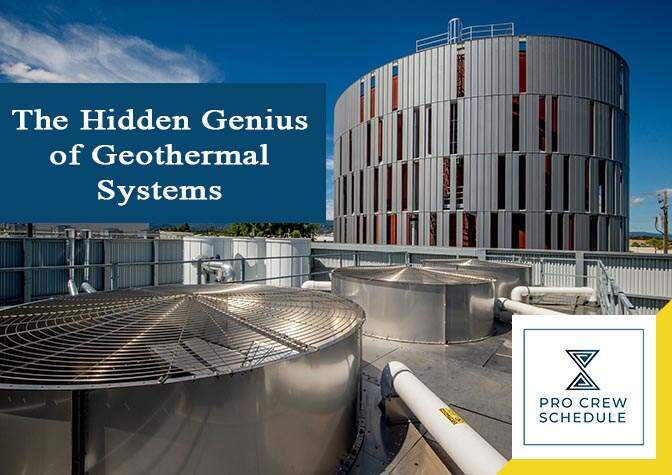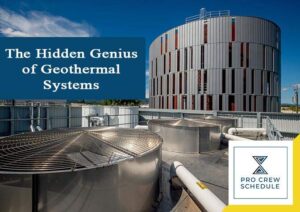Your clients have a lot of options today in terms of cooling and heating systems. One ideal choice is just right below their feet – getting the advantage of the earth’s consistent underground temperature almost thirty feet below the surface. For more than sixty years, geothermal HVAC systems are widely used in the U.S. and even worldwide. This heating and cooling system work with nature and not against it.
HVAC professionals like you must know the increasing demands of GHPs and even other construction project management trends. In the first place, you ought to know your client’s main preferences. For instance, if your client prefers to install a GHP system for their business, listen up intently! Here are the many things you have to know about geothermal heat pumps. Let’s dig beneath the surface to discover how a geothermal system works smarter (not harder) to help save money and energy.
What is Geothermal HVAC?
Geothermal HVAC systems use Earth temperature in terms of heat exchange. While some other areas of the world experience intense climates, the temperatures underground remain constant. Geothermal heat pumps are being considered a form of high-efficiency heat pump. The systems often rely on heat transfers between the ground and air to provide heating and cooling to buildings and even homes. Two other forms of geothermal systems are deep/enhanced geothermal and direct use geothermal.
Direct use of geothermal is widespread in regions with tectonic and volcanic activity, which often results in naturally heated groundwater. In the systems, hot water is being pumped to utilize in its present state. Enhanced and deep geothermal systems are commonly used to create electricity for large commercial and industrial applications. They typically rely on steams located far below the Earth’s surface area that is accessed by drilling.
Traditional HVAC Systems vs. Geothermal Heating and Cooling
Yes, geothermal heating and cooling systems are very energy-efficient compared to traditional air-source HVAC systems. The other most significant reason why a geothermal HVAC system is ideal for your client’s building is its convenience and flexibility advantages. Check out a few quick proven facts about geothermal heat pump’s efficiency:
- Energy.gov has estimated that geothermal HVAC systems are commonly 25-30% more efficient than traditional HVAC systems.
- According to Energy.gov, a geothermal HVAC system can be 400-600 more efficient than a typical HVAC system during cold winter nights.
- According to Energy Environmental Corporation, for each unit of energy a certain geothermal heat pump system often uses, 3-5 units of energy are being supplied as heat. It only means that a geothermal heat pump increases the energy it uses, making it 200-400% efficient.
Moreover, Energy.gov says additional factors have also played into determining whether or not geothermal HVAC heat pumps are right for your client. When it comes to pricing a geothermal system, HVAC technicians must first become acquainted with the installation process to understand how the cost is derived. See below the factors to consider.
- Local energy costs. It depends on where your client resides because local electrical costs might be significantly higher. It can be more economical for your client to heat their buildings with natural gas.
- The size of the building. HVAC technicians know that horizontal loop systems have more cost-efficient installations. However, it requires more property spaces than vertical loop systems, which usually have higher installation costs.
- The timing of installation. The ideal time to consider a new geothermal HVAC system is when your client plans a major renovation project.
- The surrounding landscape. No matter what kind of geothermal system you plan to install, it will take some excavating. Depending on the local HOA, you may or not face several construction and installation challenges. Only the best project management software can help HVAC technicians in managing massive projects like this.
- The soil type that makes up the property. Your client’s property and its terrain will determine how well heat is transferring. It also determines how much geothermal loop piping you will need to install.
- Size of the heat pump. Based on the building’s size, climate, insulation, and cooling and heating amount, it is calculated. In return, it enables contractors to calculate the exact size of the heat pumps primarily for the job.
- Size of the loop field. The size of the loop field is also one big factor that comes into play. The system’s size alongside the client where the property is located will dictate the amount of pipe. Complicated procedures like this should be best monitored using an advanced software tool. A subcontractor scheduling software will not just make the procedures easy to implement; it will also efficiently supervised the crew very well.
- Usability of current ductwork. In many cases, ductwork isn’t considered a big factor since most existing ductwork commonly requires little to no adjustments to fit geothermal heating and cooling. Ductwork is simply a necessity for most HVAC systems.
Geothermal heating and cooling systems have lots of advantages and can be the best way to save energy costs and money over time. For HVAC technicians, they can experience tons of advantages using construction scheduling software. It is designed for project management purposes and help construction professionals with everyday work. Pro Crew Schedule is an excellent choice and still number one in the market. Request for a live demo now!
Is a Geothermal HVAC System Really Worth It?
Yes. A geothermal HVAC system can certainly be worth it because of how energy efficient it is. Your customers will not get bothered by using as much electricity to get the same level of heating and cooling results. Even a traditional heating and cooling system cannot get the same results. Apart from being energy-efficient, which can incredibly save utility costs, this system also lasts longer.
Additionally, these systems need less maintenance, causing to decrease in system expenses over the system’s lifespan. Here are five other amazing things about geothermal HVAC systems that make it worth it. Read below.
1. It can be used in any climate
Apparently, geothermal heat pumps can function and operate in any climate settings – cold or hot, because of the earth’s consistent underground temperature. The temperature varies depending on the current location. As a matter of fact, millions of GHP systems are already cooling and heating businesses and homes worldwide, including all fifty U.S. states.
A report from the U.S. Department of Energy shows that more than half of shipments for GHP have gone to ten states – Illinois, Florida, Indiana, Michigan, Missouri, Minnesota, New York, Texas, Ohio, and Pennsylvania.
2. Open and closed-loop systems
Any of your clients are given numerous options in terms of selecting a GHP system. Two of the most common options include open and closed-loop designs. In fact, almost eighty-five percent of GHPs in the U.S. utilize ground heat exchangers for fluid circulation purposes. A closed-loop design is typically used for this option.
The pipes are commonly made of plastic tubing and are concealed horizontally (6 ft. deep) or vertically (600 ft. deep). The ground heat exchange system designs often vary and depend on the soil and climate conditions, accessibility to groundwater, land availability, and local installation costs.
3. Reduce carbon emissions and peak electricity demands
As stated above, GHPs are proven to be more energy-efficient compare to any other HVAC systems that exist today. It helps in lightening loads on the electric grid, particularly during summer peak demand. Additionally, GHPs can help lessen emissions because of its efficiency.
Geothermal systems are not just energy-efficient but also clean and safe to operate. Since there’s no combustion involved, there’s no need to get anxious about common concerns like carbon monoxide poisoning. This technology uses free and renewable energy directly from the earth’s ground. It doesn’t use flammable fossil fuels, making the whole system safer compared to any other HVAC systems on the market.
4. It creates more U.S. Jobs
GHP systems help in expanding the U.S. energy economy. All parts like heat pumps, ground heat, and others are originally made in the United States. Virtually, the installation of GHPs will never be outsourced. It helps in stimulating local economies by hiring experienced contractors to dig holes and install GHP systems.
The increasing job opportunities for HVAC technicians and contractors also increase the demands for construction management technology.
5. Life-cycle cost
Traditional HVAC systems last about 10-15 years on average, including maintenance. Since GHP systems are not placed directly outside, they are not subject to a normal weather-related tear and wear caused by snow, ice, and rain. In fact, the indoor portion comprises compressors, fans, and pumps, which can last for many decades. The rest of the whole system (earth loop) is buried under the ground. It’ll stay for several generations.
Even better, the ground loop buried in the yard that comprises geothermal pipes comes with a 50-year warranty. As mentioned earlier, GHP systems don’t need little to no maintenance beyond yearly professional inspections and periodic filter changes.
6. Flexibility and Convenience of Geothermal
Geothermal work as a heating and cooling system in one. Thus, it lessens the cost of two massive units in one. The systems are big and can cater to extensive facilities, including a swimming pool and the whole building area. The consumption of space is much lesser and GHPs are a noiseless solution. Expect that high-quality air is produced, and it lessens allergies, helping those with asthma live healthier and breathe better.
Key Takeaways
In several markets where most customers can afford the upfront costs of geothermal HVAC systems, there will be many business opportunities for HVAC technicians and contractors. Since GHP systems are more expensive and require rigorous training to install, HVAC business owners specializing in them can set themselves apart and enjoy much higher revenues than installing traditional HVAC systems.







